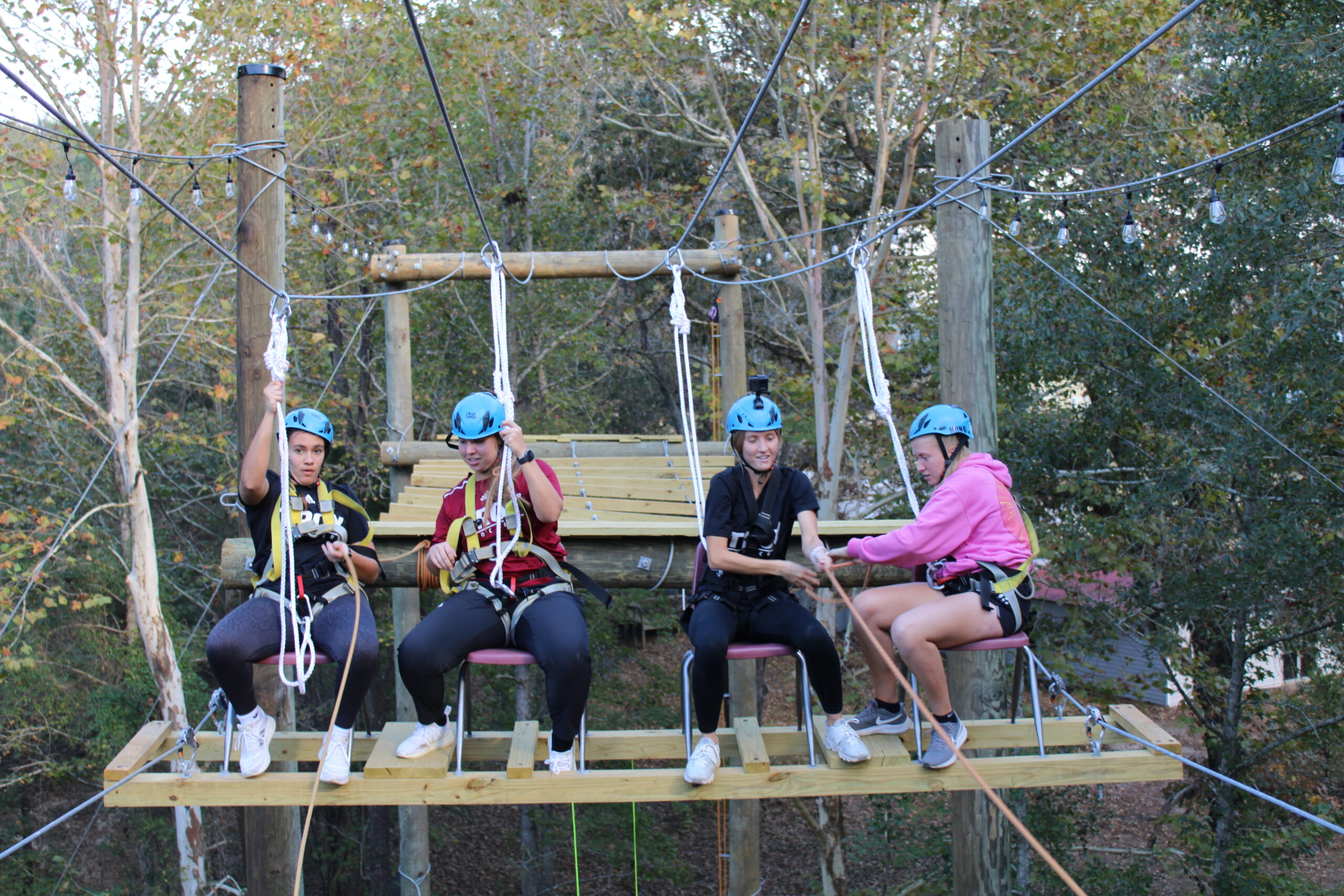Improve Team Harmony: Leading Challenge Course in Alabama
Improve Team Harmony: Leading Challenge Course in Alabama
Blog Article
Discover the Power of Partnership With a Group Difficulty Program Adventure
Getting started on a group challenge course adventure can use an one-of-a-kind chance for people to witness firsthand the transformative influence of cooperation within a team setup. As groups browse via different barriers and tasks, the real power of synergy unfolds, disclosing the capacity for boosted interaction, strategic preparation, and sociability (Team Challenge Course in Alabama). By involving in these experiential discovering environments, participants exist with a platform to discover the midsts of their joint capabilities and discover new means to get over obstacles jointly
Advantages of Group Challenge Courses
Engaging in group obstacle programs promotes partnership and enhances interaction abilities among participants. One substantial advantage of taking part in group obstacle courses is the renovation of team effort abilities.
Moreover, group challenge programs likewise help in creating management abilities. As participants deal with various obstacles throughout the training course, people typically normally tackle leadership functions based on their strengths and capacities (Team Challenge Course in Alabama). This hands-on experience allows them to practice decision-making, problem-solving, and delegation within a supportive environment
In addition, these programs promote trust and friendship amongst team participants. By relying on each various other to conquer barriers, individuals build depend on and develop more powerful connections. This feeling of friendship expands past the course, favorably affecting team effort and partnership in various settings, including the work environment.
Enhancing Team Interaction Skills
In the context of group obstacle courses, the growth of reliable group interaction abilities plays a pivotal duty in enhancing joint initiatives and accomplishing shared purposes. Concise and clear communication is essential for groups to successfully browse the difficulties offered in these training courses. By enhancing communication abilities, employee can share their ideas, pay attention proactively to others, offer responses constructively, and coordinate their actions successfully.
Effective interaction promotes an encouraging setting where staff member feel comfy expressing their ideas, requesting help when needed, and supplying aid to their peers. It assists in constructing depend on among staff member, which is important for smooth cooperation and analytical. Furthermore, enhanced interaction decreases the likelihood of misunderstandings, disputes, and mistakes that can emerge when messages are vague or misunderstood.
With group obstacle courses that stress interaction skills, individuals can exercise various kinds of interaction, such as spoken, non-verbal, and active listening. These experiences not just improve synergy throughout the program yet likewise provide valuable abilities that can be transferred to the participants' specialist and personal lives.
Strategies for Reliable Cooperation
What are the crucial approaches that promote reliable cooperation amongst team participants in difficult settings? Reliable collaboration in challenging atmospheres requires clear communication, common regard, and a shared vision. One important technique is establishing open lines of communication where employee feel comfy sharing their ideas, issues, and comments. Encouraging active listening among team participants makes certain that every person's point of views are listened to and valued, bring about more informed decision-making procedures.

Establishing clear objectives and expectations is also crucial for reliable collaboration in challenging atmospheres. When group participants recognize what is anticipated of them and have a clear roadmap to comply with, they can straighten their efforts in the direction of an usual goal. On a regular basis assessing progress, supplying constructive feedback, and making required changes in the process are vital components of effective collaboration in tough settings.
Overcoming Obstacles Together
To effectively navigate and overcome challenges as a cohesive unit, teams should apply the methods for effective cooperation focused in difficult settings. When confronted with challenges throughout a team difficulty training course journey, people must collaborate, attracting upon each group find participant's strengths to check my reference get over the difficulties jointly. Interaction plays a crucial role in this process, as group members need to efficiently convey ideas, listen proactively, and provide assistance to each other. By promoting an atmosphere of open communication, teams can attend to barriers head-on, brainstorm solutions, and adapt promptly to altering conditions.
Moreover, team effort is crucial for overcoming obstacles together. Each staff member brings an unique perspective and ability to the table, enabling for a varied series of analytical techniques. Encouraging inclusivity and appreciating each team member's contributions fosters a sense of unity and boosts morale, eventually resulting in even more successful obstacle conquering. With cooperation, shared obligation, and a supportive team dynamic, groups can browse obstacles with confidence and emerge stronger and a lot more united on the various other side.

Structure Count On and Camaraderie
Developing a foundation of trust and friendship among staff member is vital for cultivating a collaborative and supportive atmosphere for overcoming obstacles together. Trust forms the basis of efficient interaction, enabling team members to really feel risk-free expressing their ideas, problems, and responses. When people rely on each other, they are more likely to work together openly, share sources, and work towards typical goals. Sociability, on the other hand, strengthens the psychological bonds within a resource team, causing raised morale, commitment, and a feeling of belonging.
Group difficulty courses supply an exceptional opportunity for teams to bond with encountering physical and psychological barriers with each other. By investing time and effort right into activities that promote trust fund and friendship, teams can develop a strong foundation that enhances their capacity to function with each other successfully and accomplish success.
Final Thought
To conclude, group challenge training courses use many benefits for improving communication abilities, creating effective cooperation techniques, conquering barriers with each other, and structure trust and camaraderie amongst team members. By taking part in these journey training courses, teams can reinforce their partnerships, improve their analytic capabilities, and collaborate extra properly in the direction of common goals. Partnership is a powerful tool that can lead to greater success and communication within a team.

Team challenge courses offer an exceptional chance for groups to bond with encountering mental and physical obstacles with each other.In verdict, group obstacle programs offer numerous advantages for boosting interaction skills, creating effective collaboration strategies, getting over barriers with each other, and structure count on and sociability among team participants.
Report this page